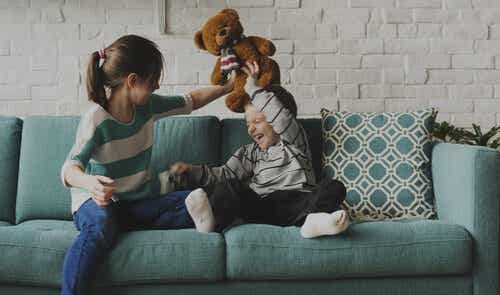
Last update: Augusts 10, 2017
Changes within family dynamics are important. Times, meals and rest. Not to mention when parents suddenly turn their attention to someone else or the new division of tasks and responsibilities. All older brothers know perfectly well what we are talking about. It is important to manage this from the point of view of an eight or ten year old.
It is precisely between the ages of eight and ten that children realize they can experience two emotions at the same time. Feeling angry because someone who has taken their place has arrived and feeling happy just for the arrival of the little brother. Emotional ambivalence must be seriously considered by adults. The key is to explain these contradictory feelings by specifying that the parents understand them.
Between laughter and example
Many parents believe the only challenge is raising the new family member. Nevertheless, another equally important challenge lies in rebalancing the expectations and responsibilities of the eldest child. It is a difficult balance that often ends up pushing the older brother away, complicating his life. The feeling of no longer being an only child can lead him on two different paths (indifference or hyper-responsibility), with dire consequences in both cases.
"What strange creatures are brothers!"
-Jane Austen-
It may happen, for example, that the older brother gets too involved in taking care of the little one, even taking the place of his parents when they are absent, but also when they are present. This can degenerate into excessive pressure and the limitation of the right of older siblings to make mistakes.
The first-born must adapt to their new role by taking on tasks appropriate to their age. It will be up to the parents to be fair in this regard. The ideal is that the parents put the eldest child in a position to be able to play the role that belongs to him and not others.
The union of brothers is strength
"How did the major react?" is one of the catchphrases that one hears asking. There is nervousness, jealousy, envy, anger, fear ... The struggling routines and habits found to give structure to a child's emotional and academic development suddenly have to be rebuilt from scratch. And it's not just about that, but also about having to deal with a new member.
“As we got older, my brothers acted like they didn't care about me. But I always knew they were there, ready to take care of me. ”.
– Catherine Pulsifer –
However, this new responsibility also hides positive emotions (fun, satisfaction and euphoria). There is nothing better than finding yourself accomplices and discovering a connection that can manifest itself without having to resort to the use of words. Together with a younger sibling, there is also the possibility of sharing secrets, releasing tensions or finding a common place in which to disconnect from the world.
Sowing the seeds of trust and affection is important. It is thanks to them that fraternal feeling will grow, a feeling capable of going far beyond genetics. It is possible that over time the type of relationship established undergoes transformations. The age difference places the two brothers in two completely different moments of development. The important thing, however, is that little by little the asymmetry given by the age difference decreases allowing to be, as well as brothers, friends with the awareness of being there for each other, of being able to count on mutual support.
“Outside we grow. But this is not the case with brothers and sisters. We have always known each other. We know our hearts. We share jokes, we remember secrets related to our family, moments of pain and joy. We live outside the effect of time. "
-Clara Ortega-


























